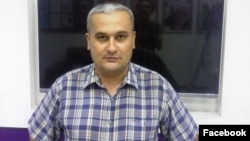An Uzbek journalist, who had been detained in Kyrgyzstan since earlier this month, was freed Sunday in Uzbekistan after being extradited the day before.
Bobomurod Abdullaev was extradited Saturday to face unspecified criminal charges in Uzbekistan, despite concerns raised by the journalist’s lawyer and international press freedom groups. They warned the journalist is at risk of torture if extradited.
Abdullaev, who is based in Germany, was detained by Kyrgyz intelligence at a cafe in the nation's capital, Bishkek, August 9. The following day, a district judge said the arrest stemmed from an extradition request by Uzbek officials who accuse Abdullaev of “disseminating materials that target the constitutional order of Uzbekistan via social media.”
Abdullaev has denied the accusations.
Uzbek officials neither confirmed nor denied the nature of the charges Sunday, according to Reuters. They said they had released Abdullaev, whom they had questioned Saturday.
Abdullaev’s lawyer, Sergei Mayorov, who was present for the questioning, told Reuters the journalist had been released, pending an investigation. He also told the news service Abdullaev had to sign a non-disclosure agreement, which prevented him from discussing the charges.
Uzbekistan’s state security released a video showing Abdullaev thanking Uzbek President Shavkat Mirziyoyev for his release, Reuters reported.
Last week, Daniel Rosenblum, the U.S. ambassador to Uzbekistan, had joined calls via Twitter for Kyrgyz officials to release Abdullaev.
"The Governments of both Kyrgyzstan and Uzbekistan should respect Mr. Abdullayev’s freedom of movement and allow him to depart the Kyrgyz Republic to his destination of choice," Daniel Rosenblum, the U.S. ambassador to Uzbekistan, tweeted.
"[Uzbek President Shavkat Mirziyoyev] spoke eloquently about media freedom and journalists’ rights in his Constitution Day speech last December, and many times since," Rosenblum wrote. "The U.S. agrees that a free and independent media is indispensable to a functioning democracy."
Outside the Kyrgyz court earlier this month, Abdullaev said he had recently been accused of operating an anonymous Facebook account that publishes allegations of corruption by government officials under the Uzbek president.
In July, Abdullaev posted a video to YouTube denying he was behind the anonymous account, known as “Qora Mergan,” or "Black Sniper," which, combined with its pseudonymous Telegram account, has at least 3,000 followers.
During Abdullaev's Aug. 10 hearing, the "Black Sniper" account posted a statement denying any connection to him.
Abdullaev, 47, has filed stories for the independent regional news site Fergana, Radio Ozodlik, and the London-based Institute for War and Peace Reporting. Radio Ozodlik is the Uzbek service of Radio Free Europe/Radio Liberty, a VOA sister outlet run by the U.S. Agency for Global Media.
The journalist traveled to Kyrgyzstan from Germany in February for a four-month training program at the American University of Central Asia but became stranded by coronavirus flight restrictions.
Uzbek authorities previously arrested Abdullaev in September 2017, accusing him of promoting a violent overthrow of the state in a series of "extremist" articles published under the pseudonym Usman Haqnazarov.
Abdullaev admitted to having used that pen name for 15 years — a common practice for Uzbek political analysts — denied that his articles promoted violence. He was sentenced to five years in prison, where he said he was forced into making false confessions by torture.
He was released early after a court commuted his prison term to community service, and in November 2019, Abdullaev relocated to Germany, as part of the emergency assistance program run by press freedom organization Reporters Without Borders (RSF), which also had demanded his release.
This article includes information from VOA's Uzbek service.





